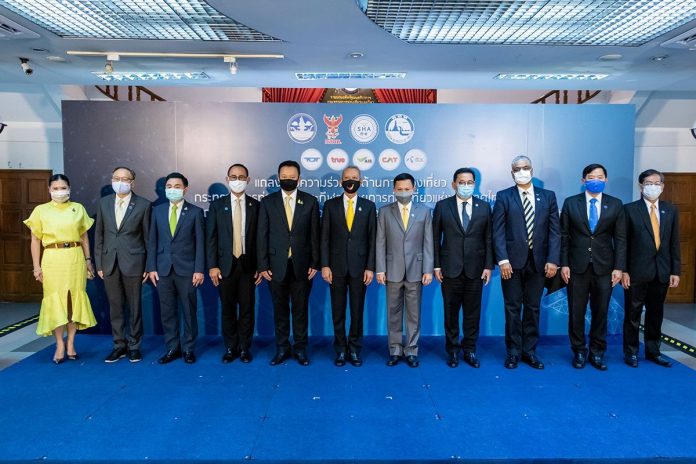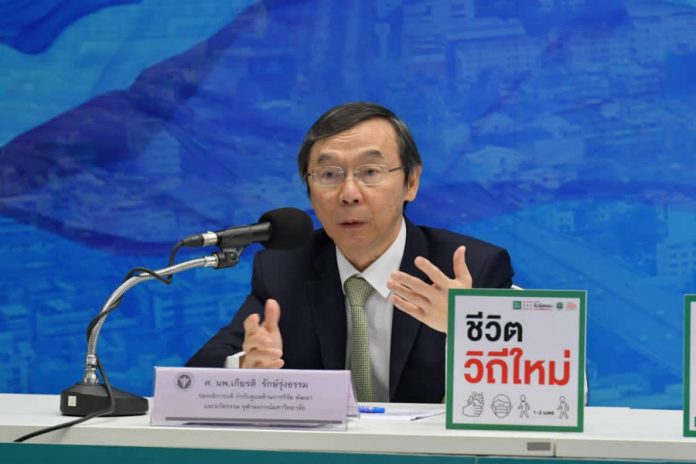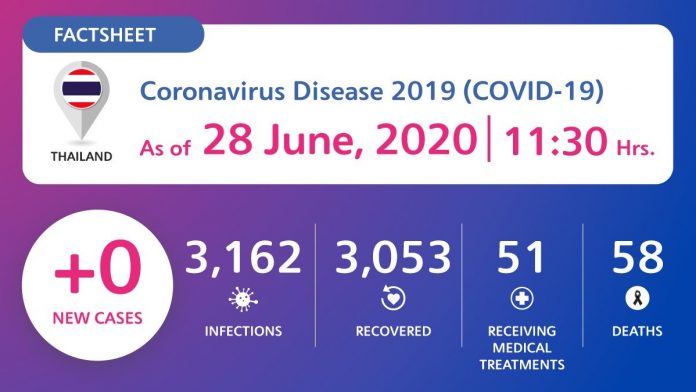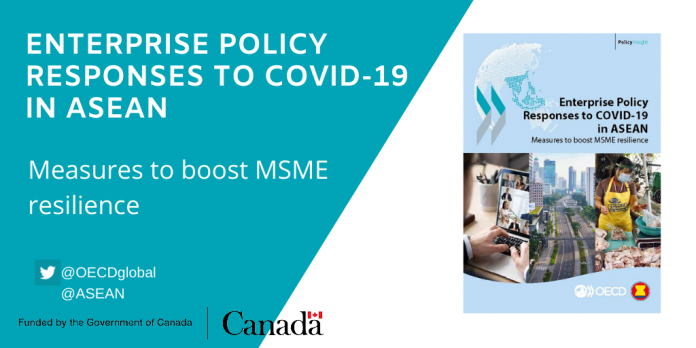JAKARTA, 27 June 2020 – In commemorating the International MSME Day, the ASEAN Coordinating Committee on Micro, Small and Medium Enterprises (ACCMSME) and the Organisation for Economic Cooperation and Development (OECD) released a Policy Insight on boosting MSME resilience during the COVID-19 pandemic.
ASEAN Member States (AMS) have made laudable efforts to strengthen the resilience of their enterprises in response to the COVID-19 crisis. The report aims to track and analyse measures taken by AMS to mitigate the economic impact of COVID-19 on businesses, particularly MSMEs. It also proposes some possible ways forward, drawing upon lessons learnt and success stories collected from OECD and partner countries.
The report highlights the various measures being taken across the region in an accessible way. It is one of the ACCMSME’s contributions in support of the ASEAN Leaders’ Declaration of the Special ASEAN Summit on COVID-19 and ASEAN Economic Ministers’ Statement on strengthening ASEAN’s economic resilience in response to the outbreak of COVID-19, which commit to help people and businesses survive and recover from the crisis, through cooperative action.
AMS have deployed a mix of short-term stimulus measures alongside longer-term structural measures. They have encouraged enterprises to re-evaluate their business models, upskill their staff, digitise and explore new partnerships to source and sell their products and services.
This is not to understate the magnitude of the challenge. The global economy is currently experiencing its deepest recession since the Great Depression and unemployment is surging rapidly.
Supply chains have been disrupted, financial markets spooked, and many businesses are facing severe liquidity problems. MSMEs are likely to be particularly affected, and this is notable for ASEAN where such enterprises make up 88.8-99.9% of total establishments and account for 51.7%-97.2% of total employment.
Beyond figures, MSMEs sustain the livelihoods of millions of people and form the fabric of many ASEAN economies. Extraordinary stress on these entities should be addressed as a matter of priority.
Chair of ACCMSME and Director General of the Department of SME Promotion, Ministry of Industry and Commerce of Lao PDR Bountheung Douangsavanh noted that “while each AMS is doing its best to manage the crisis domestically, information sharing and learning from one another is crucial to strengthen MSME resilience in the region.’’
“Invaluable exchanges of information and lessons learnt would pave the way for effective regional actions and collaborations to go through this hard time. We hope this knowledge sharing will benefit everyone, commemorating the International MSME Day on 27 June 2020,” he added.
Meanwhile, Director of OECD Global Relations Andreas Schaal recognised the release of this report as the result of a strong and productive partnership with the ACCMSME, cultivated over many years.
“Enterprises are facing almost unprecedented stress, yet private sector innovation, agility and confidence will be key to finding a way out of this crisis. It will also be key to mitigating deep and broad economic hardship, and widening inequality,” Schaal shared. “I therefore applaud this effort to track enterprise policy responses in ASEAN, and to identify creative and cooperative solutions to keep enterprises afloat, and, ultimately, to help them thrive.”
Furthermore, Ambassador of Canada’s Mission to ASEAN Diedrah Kelly stated that “meaningful partnerships that facilitate collective learning and growth to ensure MSMEs can remain operational during this pandemic are critical for sustainable economic recovery.”
“Canada is pleased its partnership with the OECD and ACCSME supports more integrated, competitive, and resilient ASEAN MSMEs, thereby strengthening their ability to recover from the COVID-19 pandemic and contribute to the ASEAN economic community,” she concluded.
This work was made possible thanks to the Government of Canada, through its Canada-OECD Project for ASEAN SMEs. As a living document, the report will be updated as the situation changes, new challenges emerge and additional programmes are rolled out. It thus hopes to offer comprehensive insight into the measures being enacted across the ASEAN region.
The publication is available here.
About ACCMSME
The ASEAN Coordinating Committee on Micro, Small and Medium Enterprises (ACCMSME) is the ASEAN body responsible for strengthening MSMEs’ participation in ASEAN integration and in deepening and broadening their contribution to ASEAN’s economic growth. Comprising the ASEAN Member States’ Heads and representatives of MSME agencies, and supported by the ASEAN Secretariat, the ACCMSME facilitates the implementation, monitoring and evaluation of ASEAN Strategic Action Plan for SME Development 2016-2025 (SAP SMED 2025), with the mission to create globally competitive, resilient and innovative MSMEs that are seamlessly integrated to the ASEAN community and to achieve inclusive development in the region
About OECD (oecd.org)
The OECD is a unique forum where governments work together to address the economic, social and environmental challenges of globalisation. It is also at the forefront of efforts to understand and to help governments respond to new developments and concerns, such as corporate governance, the information economy and the challenges of an ageing population. The Organisation provides a setting where governments can compare policy experiences, seek answers to common problems, identify good practice and work to co-ordinate domestic and international policies. It has recently launched a platform to help track the impact of COVID-19 and international policy responses, across a wide range of areas. The platform can be accessed at: https://www.oecd.org/coronavirus/en/.
About Canada-OECD Project for ASEAN SMEs (COPAS)
The Canada-OECD Project for ASEAN SMEs (COPAS) supports the implementation of the ASEAN Strategic Action Plan for SME Development 2016-2025 (SAP SMED 2025). The project is being implemented by the OECD’s Southeast Asia Regional Programme (https://www.oecd.org/southeast-asia/regional-programme), in consultation with ACCMSME, with funding support from the Government of Canada. COPAS is structured around two pillars. The first supports policy dialogue through providing technical assistance to ACCMSME and the ASEAN Secretariat in their endeavor to implement SAP SMED 2025. The second focuses on producing analytical work in priority areas such as SME productivity, access to finance, market access and internationalisation, and the overall development of SME-related policies and their monitoring.
Source link









